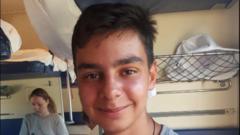Arseny Turbin, a teenager and one of Russia's youngest political prisoners, has lost an appeal against a five-year prison sentence that has garnered significant attention. Arrested at the age of 15 in the summer of 2023, Arseny became a focal point in discussions around the treatment of young anti-war activists in Russia following the invasion of Ukraine.
Authorities accuse him of affiliation with the Freedom of Russia Legion, a group of Russian volunteers fighting on behalf of Ukraine, which the Russian government labels a terrorist organization. Although an appeals court recently reduced his sentence by a mere 24 days, it has done little to alleviate concerns of politically motivated prosecutions against minors in Russia. According to the human rights group OVD-Info, Arseny is among a group of nine minors facing similar charges amid ongoing repression of civil liberties related to the war in Ukraine.
Arseny maintains his innocence, stating that he only researched the group and never sought membership. His mother, Irina, adamantly supports his claim, expressing disbelief at the judicial process that led to his conviction. Investigators allege that Arseny disseminated anti-Putin leaflets, a charge he admits to but asserts was done independently, with no instructions from the Legion.
His visible dissent against the war and criticism of President Vladimir Putin manifested in various forms, including political discussions at school and active social media engagement. It was these actions, according to law enforcement, that ultimately led to his arrest. In August 2023, Arseny's family home was raided by the FSB, where agents confiscated electronic devices and subsequently detained him for alleged involvement with the Legion.
The circumstances surrounding his arrest and subsequent detention have raised alarm about the respect for legal rights in Russia. His absence of legal representation during police questioning prompted Irina to express her frustrations, feeling that authorities crafted evidence of guilt against her son. Testimonies from schoolmates pointed to Arseny’s political views but failed to substantiate claims linking him to any terrorist group.
While awaiting sentencing, Arseny endured several months of house arrest and then a transfer to a detention center, where he has experienced severe emotional and physical strain, resulting in significant weight loss and isolation. Reports from his educators highlight his intellectual promise and a passion for subjects including physics and political science, aspirations now overshadowed by wrongful incarceration.
Irina's worry extends beyond Arseny’s well-being, as societal backlash has led friends and neighbors to distance themselves from the family, reinforcing an unsettling reality for those who oppose the Kremlin. As she battles to prove her son’s innocence, Irina contemplates the implications of the judicial system in Russia, hoping others will not suffer facing the same fate as her son.


















